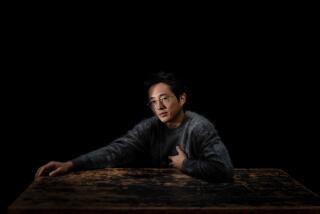Review: South Korean thriller ‘The Wailing’ a slow-burning supernatural freakout
- Share via
The connoisseur of contemporary horror cinema will be no stranger to some of the images that appear in “The Wailing.” Oppressively heavy rain. Disemboweled livestock. A candlelit shrine. A screaming, possibly demon-possessed child. A rabid zombie lurching from one victim to the next, teeth bared and pustules flaring. Crime scenes that suggest “CSI” as photographed by Gregory Crewdson, in which every putrefying corpse and gore-spattered surface has been laid out with an almost surreal attention to detail.
Chances are, however, you haven’t seen all these things in the same movie, let alone assembled with such a rich, unsettling variety of moods. Set in Goksung, a remote South Korean village marked by a deceptive air of mundanity, if not quite innocence, “The Wailing” runs a tense but unhurried 156 minutes, rifling through its genre grab-bag in a leisurely, comprehensive fashion that might easily be mistaken for bloated or arbitrary — the latest example of our derivative, more-is-more movie culture.
If only it were that easy. Opening and closing with solemn invocations from the biblical book of Luke, and marked by bizarre, disquieting eruptions of humor, “The Wailing” is the rare commercial thriller whose feverish manipulations can’t be dismissed as merely callous or exploitative. It’s a film you watch in a state of slowly gathering dread — not so much because it’s trying to scare you (it succeeds without trying), but because you’re never quite sure, on a deeper level, what it wants from you. At times the movie doesn’t seem too sure, either. It’s a supremely patient freakout.
See more of our top stories on Facebook >>
Arriving on Western shores fresh off its record-breaking box-office success at home, this is the latest and most ambitious work yet from the gifted writer-director Na Hong-jin, who racked up commercial clout and festival acclaim with “The Chaser” (2008) and “The Yellow Sea” (2010). Those memorably grisly thrillers added to a persuasive body of evidence — one that includes the films of Kim Jee-woon (“I Saw the Devil”) and Park Chan-wook (“Oldboy”) — that when it comes to crime fiction, few national cinemas can touch Korea for pitilessly sustained brutality. “The Wailing” suggests that Na may be in a special class by himself. When an onlooker shrieks, “What kind of twisted freak is he?” you’ll be forgiven for wondering if he’s talking about the filmmaker.
He’s actually speaking in reference to a local ginseng farmer who, under the suspected influence of some very bad mushrooms, has slaughtered his wife and another man. Arriving on the scene several minutes late, as usual, is Jong-gu (Kwak Do-won), a portly sergeant played here as a bumbling caricature of police incompetence (not unlike the cop played by Song Kang-ho in Bong Joon-ho’s 2003 masterpiece, “Memories of Murder,” a clear influence here). Well fed and under-trained, Jong-gu is also a family man who dotes on his wife and their precocious young daughter, Hyo-jin (Kim Hwan-hee), who ups the personal stakes when she starts to exhibit ominously Regan MacNeil-like symptoms.
That development takes its time, and Na, pausing at times to admire the rural landscape (beautifully framed by the cinematographer Hong Kyung-pyo), allows the red herrings (and bodies) to pile up even as he casts eerie signs and portents in every direction. More murders occur, not all of them fungal in origin. A cop recalls a vivid dream about a red-eyed, diaper-clad man consuming raw deer meat. A Japanese hermit (Jun Kunimura) hovers silently around the edges of the story, his motives as inscrutable as those of a nameless woman in white (Chun Woo-hee). A shaman (Hwang Jung-min) turns up and performs a frenzied ritual involving drums, gongs and garroted chickens.
Speaking of chickens: Those frequent references to roosters and fish are surely no accident. They are, rather, theological bread crumbs in a mystery that evinces the gory exuberance of John Carpenter and, sometimes in the same breath, the grave spiritual intensity of Carl Theodor Dreyer. What does it all mean? What is the source of the evil at work here? Is a savior on the horizon, or is it the Antichrist? And in the end, does it even matter?
That last question gets at the troubled heart of Na’s movie, which, rather than distinguishing between heroes and villains, seems to fix everyone with the same sorrowful gaze. The English-language title is no accident: The movie is a veritable symphony of cries, shrieks and screams of despair, and Na seems riveted by the very spectacle of his characters’ suffering in a way that can’t be easily chalked up to either empathy or sadism. What makes “The Wailing” so unusually disturbing is the almost palpable aura of evil it radiates from calm start to sorrowful finish. More disturbing still is the way that evil can seem indistinguishable from compassion.
------------
‘The Wailing’
MPAA rating: Unrated
Running time: 2 hours, 36 minutes
Now playing: In limited release
MORE:
Our complete summer movie guide >
Every single movie coming out this summer >
For ‘X-Men: Apocalypse,’ think Old Testament, wrath-of-God-like stuff
Debating summer’s most anticipated summer movies: Do we really need another Jason Bourne?
More to Read
Only good movies
Get the Indie Focus newsletter, Mark Olsen's weekly guide to the world of cinema.
You may occasionally receive promotional content from the Los Angeles Times.









